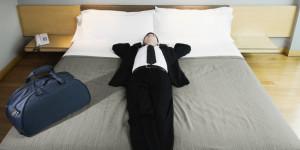 Whether you’re traveling with friends and staying in a house or resort, or traveling for business and staying in a hotel, the unfamiliar bed, place, sounds and light can all interfere with your beauty rest.
Whether you’re traveling with friends and staying in a house or resort, or traveling for business and staying in a hotel, the unfamiliar bed, place, sounds and light can all interfere with your beauty rest.
Not only are sleep interruptions frustrating when all you want is a little bit of shuteye, but it can also leave you feeling fatigued the next day when you’re scheduled to tackle work meetings or fun adventures – not to mention a lack of sleep can weaken your immune system, putting you at risk of catching something when you’re already being exposed to a plethora of unfamiliar germs.
Here’s what you can do on your next trip to sleep like a baby.
- Avoid alcohol and caffeine
When you’re traveling for business or pleasure, it can be easy to fall out of your normal and healthy routine, especially when it comes to your bedtime. It can be tempting to indulge in a couple glasses of wine before bed to help you fall asleep, but alcohol can disrupt your sleep patterns and leave you feeling even more tired in the morning.
Similarly, if you’re tired during the day, you may reach for a cup (or two) of coffee or another caffeinated beverage to stay awake during the day. However, drinking caffeine in the afternoon can make it much harder to fall asleep and stay asleep at night.
Eating a big meal or exercising too close to bedtime can also make it more difficult to fall and stay asleep.
Sipping chamomile tea and filling your hotel room with the scent of lavender before bed with a candle or essential oil can be effective sleep aids.
- Pack what makes you comfortable
If you have room in your suitcase, pack a few things from home that you think may make you more comfortable in a hotel to ease you into sleep. Maybe bringing your pillow, or just the pillow case, and a throw blanket from your bedroom will help you feel a little more at home at bedtime, and thus relaxed in a strange new place.
- Address inconvenient light
Whether it’s the light shining under your hotel door at night or light creeping through the curtains as the sun is rising, this inconvenient light is one of the biggest culprits of sleep disturbances for travelers. Before hopping into bed, make sure the blinds and curtains are completely shut without leaving spaces for that sunrise to wake you in the morning. You should also turn off the lights to see if any light will shine under your door before tucking yourself in. If it does and you think it’ll disturb your sleep, try blocking the light out with a spare towel, pillow or blanket.
Even if you’re thorough in checking for potential light disturbances, a pesky ray of light could still peak through. Pack a light-eliminating eye mask to ensure no light interrupts your beauty sleep in your hotel – it can serve double duty if you want to take a nap on a plane as well.
- Block out noise
Hotels and resorts are inevitably filled with strange noises at all hours – adjacent rooms’ doors shutting, elevators dinging, other guests coming and going, not to mention any noises outside your hotel. Like light, ambient noise is also a major sleep distraction while traveling. Consider popping in earplugs before bed or requesting a room on a higher floor and away from elevators.
If noise is a huge issue for you while you’re away from home, try bringing a portable white noise machine or downloading a white noise or ambient sound app to your smart phone. You could also simply try running the ventilation fan in your bathroom to drown out ambient noise.
And don’t forget to hang the do not disturb sign outside your door before drifting off to sleep.
- Minimize jet lag
Jet lag happens when you have trouble adjusting to rapid changes in daily light and darkness cycles – your body’s internal clock that tells you to fall asleep and wake up rely heavily on light. Changes in time zones of a couple hours or more can cause jet lag, but the symptoms are more noticeable when traveling east.
If you’re traveling east and changing time zones by three hours, you should avoid light between 12 a.m. and 6 a.m. in your destination, but seek out the light between 8 a.m. and 2 p.m. For each additional time zone, increase the hours of avoiding light and seeking light forward by one-hour increments.
Do you have any other ideas to share with us?
Photo from Smart Cars.


